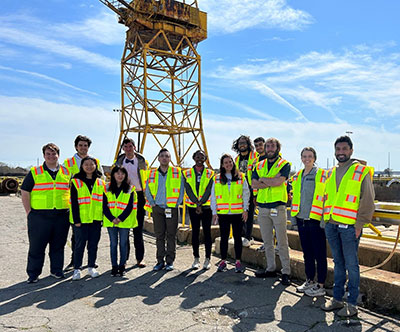
Preclinical medical students visiting a Maryland worksite
The Division of Occupational and Environmental Medicine provides faculty and professional staff for teaching activities within several schools and programs on campus, as well as community-facing programs.
Courses and Lectures
Marianne Cloeren, MD, MPH, and Joanna Gaitens, PhD, MSN, MPH teach an innovative (first in the country) 100-hour longitudinal elective in OEM (OEM 547) to first and second year medical students. This course includes worksite visits, flipped classroom teaching and “movie night” seminars. Dr. Cloeren is also one of the core faculty for Climate Change, Health and Society (CIPP 650), an interprofessional course and The Climate Crisis and Patient Health (AMED 542), an elective rotation for fourth year medical students. Our faculty teach core lectures for pre-clinical medical students on taking an occupational history, climate change and key communication strategies with patients.
Clinical Rotations
Our division hosts residents from several programs in the area for clinical rotations: Occupational Medicine residents from Johns Hopkins Bloomberg School of Public Health; Occupational Medicine residents from the Uniformed Services University of the Health Sciences; Preventive Medicine residents from the University of Maryland School of Medicine and Internal Medicine Residents from our own teaching hospital. In this rotation, residents assist in the evaluation of patients presenting with health complaints related to work or the environment, participate in fitness for duty determinations, and experience our clinical work with employee health and population health surveillance.
Community Training
Our division established a workplace-facing Overdose Response Program, which provides naloxone training and distribution for industries at the highest risk for opioid overdose. We developed and deployed a statewide naloxone train-the-trainer program to get more naloxone into the hands of construction workers, who are at highest occupational risk for overdose in Maryland; we have trained over 100 construction safety professionals to train their workers in naloxone administration. Our faculty works with the Maryland Department of Health and the Maryland Department of Labor to support training in Recovery Friendly Workplace practices. We also serve as the training hub for UMB campus-wide naloxone training.
Global Education and Training Activities
In 2009, the Division of Occupational and Environmental Medicine was named a Pan American Health Organization, World Health Organization (PAHO/WHO) Collaborating Center for Occupational Health.
Our staff provides technical expertise and content knowledge in support of the WHO Global Plan of Action on Workers' Health – with an emphasis on the healthcare sector. Our work assisting in providing technical expertise in toxicology and infection control training in collaboration with PAHO partners and WHO Collaborating Centers in occupational health in the Caribbean and the Americas. This activity also includes a provision of technical training and assistance in occupational and environmental cancer control and prevention.
Related Projects
- Since 2018, the Division of Occupational and Environmental Medicine has provided consultation to the University of Maryland’s Center for Vaccine Development in Bamako, Mali, on implementation of a Hepatitis B screening and vaccination program for health worker study staff. To better understand the occupational risks for these workers and to identify opportunities for intervention, a questionnaire about the prevalence and work practices regarding Hepatitis B was developed.
- Responding to public health needs in the PAHO region, our team has applied its occupational health expertise to assist regional partners in response to pandemics (H1N1, Guyana, 2009); long-standing threats to health workers, such as investigating a tuberculosis outbreak in pathology workers (Belize, 2011); and by providing capacity-building in training settings (Trinidad and Tobago, 2009).We have also provided virtual assistance on health worker safety policies and sanitation programs (Jamaica, 2010). Recently on-site trainings in the PAHO region on occupational cancer prevention (Grenada and Chile, 2018) are described below.
- Since 2014, the University of Maryland, Baltimore, School of Medicine began an ongoing collaboration with the Gambian Ministry of Health, the University of the Gambia School of Medicine, and Allied Health Science to strengthen the Gambian health system by building local capacity to protect health workers from workplace hazards. With our division as the lead, we performed initial facility safety visits and developed several tools (available below) to help assess occupational health and safety practices within the health sector.
- Our faculty are working with the International Occupational Medicine Society Collaborative and Workplace Health Without Borders to develop mentoring networks and educational offerings on OEM in low- and middle-income countries.
For more details on our international work, including resources, please visit the WHO/PAHO page.
